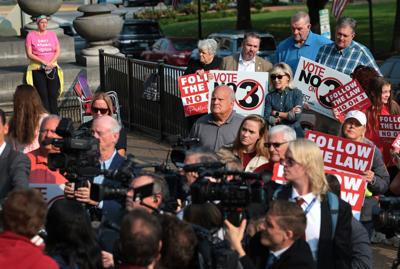
Abortion opponents watch and pray as members of the media interview attorney Mary Catherine Martin of the conservative Thomas More Society after she argued before the Missouri Supreme Court in Jefferson City to remove Amendment 3 from the November ballot on Tuesday, Sept. 10, 2024.
JEFFERSON CITY ŌĆö Although abortion opponents lost the legal fight this week to strip Amendment 3 off the Nov. 5 ballot, their last-minute lawsuit still allowed them to test out emerging arguments against the plan before a wide audience of voters.
Many of those arguments have nothing to do with abortion.
At trial, anti-abortion activists said broad protections for reproductive freedom in Amendment 3 would reverse state bans on human cloning, female child genital mutilation, in vitro fertilization for stem cell research, and transgender medical treatment for minors.
Lawyers for the pro-abortion rights campaign argued in response that a wide range of issues brought up by the other side would need to be adjudicated in the future in concrete legal disputes.
ŌĆ£The time to do that is after the measure passes,ŌĆØ Loretta Haggard, attorney for Missourians for Constitutional Freedom, said Friday in Cole County Circuit Court.
People are also reading…
Since earlier this year, when anti-abortion attack lines were largely focused on changes to abortion laws, Amendment 3 opponents have increasingly elevated issues such as transgender care for minors, cloning and more in their campaign.
The more recent arguments against Amendment 3ŌĆÖs sweeping language promise to continue into the fall campaign.
ŌĆ£Amendment 3 ends MissouriŌĆÖs abortion ban and means families ŌĆö with support from their doctors ŌĆö get to make important, personal decisions without government interference,ŌĆØ said Tori Schafer, lawyer for the ACLU of Missouri, one of the campaignŌĆÖs backers.
ŌĆ£Anti-abortion politicians will say anything no matter how outlandish to distract from the public health crisis they created in Missouri when they banned abortion,ŌĆØ she said in a statement.
ŌĆ£This is a false narrative being pushed by politicians using scare tactics to divide Missourians and distract us from what this amendment is actually about: protecting the right to abortion,ŌĆØ she said.
A SLU/YouGov poll found last month that 52% of Missouri likely voters surveyed supported the pro-abortion rights Amendment 3.
Sam Lee, longtime Missouri abortion opponent, pointed to August 2023 results by the same pollster showing 73% opposition by likely Missouri voters to gender-affirming surgeries for minors.
ŌĆ£Those are pretty high numbers,ŌĆØ Lee said. ŌĆ£If they oppose that, and they believe that Amendment 3 would allow this, theyŌĆÖd be more inclined to vote against it. I mean, weŌĆÖll see.ŌĆØ
Lee said the campaign against Amendment 3 ŌĆ£absolutelyŌĆØ benefited from the court case by getting its message out, even though it lost its lawsuit.
ŌĆ£This lawsuit is helping to educate the public about the dramatic effects of Amendment 3 if it were to be approved by the voters,ŌĆØ Lee said.
Republican U.S. Sen. Josh Hawley, who will share space on the ballot with Amendment 3, has focused his criticism on transgender surgeries for minors.
A video clip shared by his opponent, Democrat Lucas Kunce, shows recent comments by Hawley in which he says ŌĆ£the amendment explicitly says itŌĆÖs not limited to abortion.ŌĆØ
Hawley said ŌĆ£it says it ... will mandate constitutionally all reproductive health services and that includes transgender treatments for minors.ŌĆØ
Kunce on Wednesday suggested Hawley was trying to shift the conversation away from overturning MissouriŌĆÖs abortion ban, which only allows abortions in medical emergencies.
ŌĆ£Josh Hawley is so afraid of sharing the ballot with an amendment to end his total abortion ban that itŌĆÖs broken his brain,ŌĆØ Kunce said on X.
The proposed Amendment 3 creates the right to reproductive freedom, defined as the right to ŌĆ£make and carry out decisions about all matters relating to reproductive health care, including but not limited toŌĆØ abortion, birth control, prenatal care, childbirth, miscarriage care, postpartum care and respectful birthing conditions.
The state would need to demonstrate a ŌĆ£compelling governmental interest achieved by the least restrictive meansŌĆØ to deny the right to reproductive freedom, and that denials, delays and restrictions ŌĆ£shall be presumed invalid.ŌĆØ
The measure then limits a compelling governmental interest to those with the limited purpose of and having ŌĆ£the limited effect of improving or maintaining the health of a person seeking care, is consistent with widely accepted clinical standards of practice and evidence-based medicine, and does not infringe on that personŌĆÖs autonomous decision-making.ŌĆØ
Missourians for Constitutional Freedom launched the current effort to get abortion rights on the ballot in March 2023. The campaign faced multiple legal challenges, as well as a concerted, but unsuccessful, effort by Republican state lawmakers to change the initiative petition process, before the measure was certified for the ballot last month.
Cole County Circuit Judge Christopher Limbaugh, in an 11th-hour legal challenge brought by four anti-abortion activists, ruled last Friday that the abortion-rights initiative petition was defective, which would have taken Amendment 3 off the ballot. LimbaughŌĆÖs ruling was reversed Tuesday by the Missouri Supreme Court just hours before the deadline to finalize ballots for the Nov. 5 election.






















